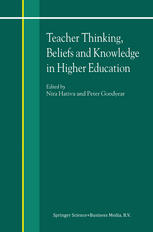

Most ebook files are in PDF format, so you can easily read them using various software such as Foxit Reader or directly on the Google Chrome browser.
Some ebook files are released by publishers in other formats such as .awz, .mobi, .epub, .fb2, etc. You may need to install specific software to read these formats on mobile/PC, such as Calibre.
Please read the tutorial at this link: https://ebookbell.com/faq
We offer FREE conversion to the popular formats you request; however, this may take some time. Therefore, right after payment, please email us, and we will try to provide the service as quickly as possible.
For some exceptional file formats or broken links (if any), please refrain from opening any disputes. Instead, email us first, and we will try to assist within a maximum of 6 hours.
EbookBell Team

4.4
32 reviewsResearch on teacher thinking, beliefs and knowledge in higher education Increasingly serious attention is being paid to the quality of learning and teaching in higher education. This is a global concern, associated with calls for greater accountability and efficiency, increases in the size and diversity of the student population and a relative decline in the real value of funds available for higher education. Teaching in higher education is having to become more professional. Agencies are being set up in a number of countries, charged with supporting and/or accrediting the development of teaching competences. (See, for example, the work of the Institute for Learning and Teaching in Higher Education in the United Kingdom. ) Faculty are paying greater attention to their teaching and to finding ways of improving the effectiveness and efficiency of the support they provide to students. Universities are shifting budgets towards the improvement of learning and teaching and are strengthening the roles of faculty developers. There is a growing stream of practical books, aimed at guiding both new and experienced university teachers (e. g. Beard & Hartley, 1987; Biggs, 1999; Brown & Atkins, 1988; Brown, Bull & Pendlebury, 1997; Brown & Knight, 1994; Gibbs & Jenkins, 1992; Hativa, 2000; Laurillard, 1993; McKeachie, 1999; Prosser & Trigwell, 1999; Race & Brown, 1993; Ramsden, 1992). These shifts are creating a demand for a better research-based understanding of the nature of teaching in higher education.